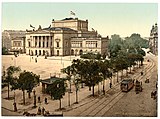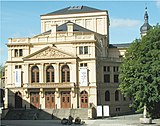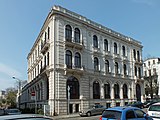Otto Brückwald
Otto Brückwald (born May 6, 1841 in Leipzig ; † February 15, 1917 there ) was a German architect .
life and work
Paul Otto Brückwald was born as the fourth and last child of the post office clerk Carl Friedrich Brückwald and his wife Emilie Pauline, born in Dresden , from Dresden . Cagiorgi, born in Leipzig. After an apprenticeship as a bricklayer, which began in 1857, he received a scholarship based on good performance, which enabled him to attend the academy. From 1860 to 1863 he studied at the Royal Academy in Dresden. In 1868 he was accepted into the Leipzig Freemason Lodge Minerva to the three palms .
Among the most important buildings, in the construction of which he played a key role, are the Neue Theater (1864 to 1868) on Leipzig's Augustusplatz , designed by Carl Ferdinand Langhans and destroyed in the air raid on December 4, 1943 during World War II , where he did the detailed planning and the Construction management taken over. He was also responsible for the planning and construction management of the court theater (1869 to 1871) in Altenburg and the festival hall (1872 to 1876) in Bayreuth with the so-called Königsbau, which was subsequently added in 1881/1882.
As one of his last buildings, he oversaw the construction of the prestigious residential building at Schwägrichenstrasse 11 in Leipzig's music district in 1894. Brückwald set up a studio in the basement of the house. Famous residents of the house were the art historian Nikolaus Pevsner and the writer Elsa Asenijeff .
In honor of the architect, a street was named after him in the so-called “architects' settlement” between the Leipzig districts of Sellerhausen and Paunsdorf .
- Important buildings in Brückwald
Residential and commercial building of the music publisher CF Peters in Leipzig, Talstrasse 10 (2014)
literature
- Horst Riedel: Stadtlexikon Leipzig from A to Z. Editor Thomas Nabert . Pro Leipzig, Leipzig 2012, ISBN 978-3-936508-82-6 , p. 71.
- Thomas Strobel: Otto Brückwald. A forgotten artist and architect. Reinhold, Munich 2006, ISBN 978-3-95755-031-6 .
- Residential and town houses in Leipzig's music district . Musikviertel eV (Ed.), Sax Verlag, Beucha 2007, ISBN 978-3-86729-010-4 , p. 74.
Web links
- Detailed biography at www.historismus.net
- Alexander Süß: Otto Brückwald (1841–1917), architect of the Bayreuth Festival Hall. (PDF) In: Website of the Freemason Lodge Minerva on the three palms. Retrieved January 30, 2017 .
Individual evidence
- ^ Gina Klank, Gernot Griebsch: Lexikon Leipziger Straßeennamen , Verlag im Wissenschaftszentrum Leipzig, 1995, ISBN 3-930433-09-5 , p. 42.
| personal data | |
|---|---|
| SURNAME | Brückwald, Otto |
| BRIEF DESCRIPTION | German architect |
| DATE OF BIRTH | May 6, 1841 |
| PLACE OF BIRTH | Leipzig |
| DATE OF DEATH | February 15, 1917 |
| Place of death | Leipzig |





